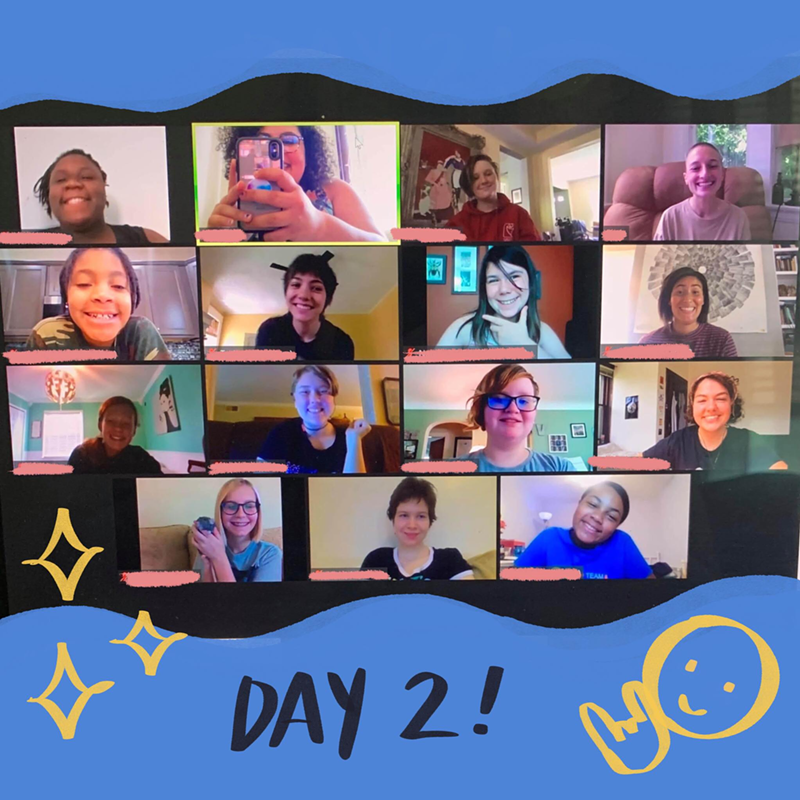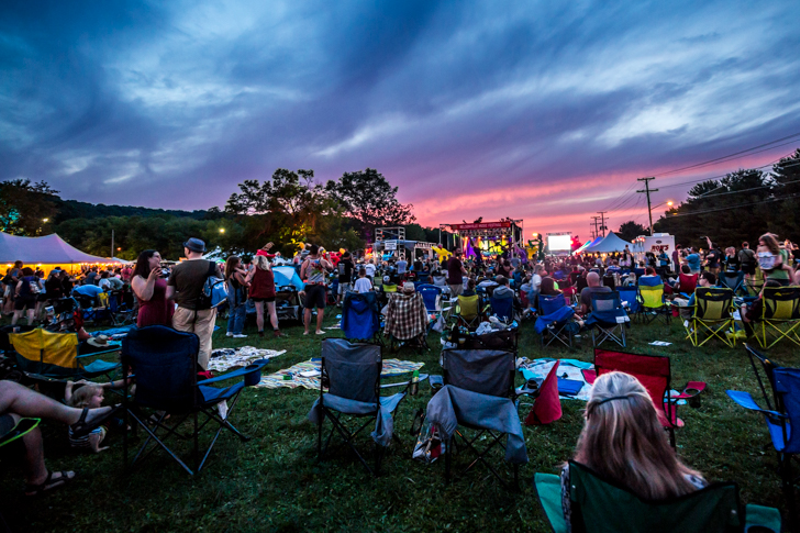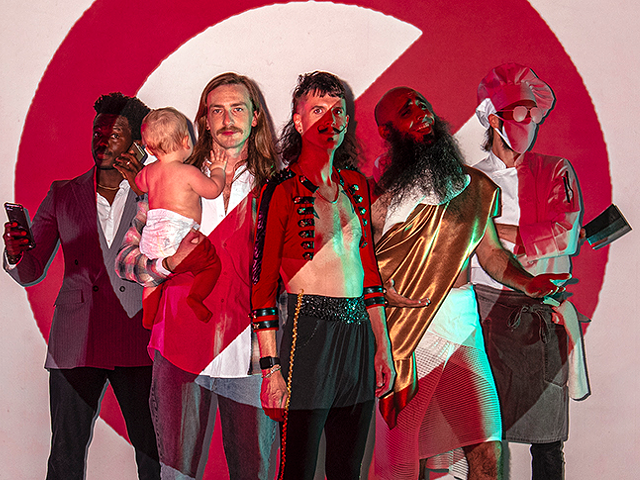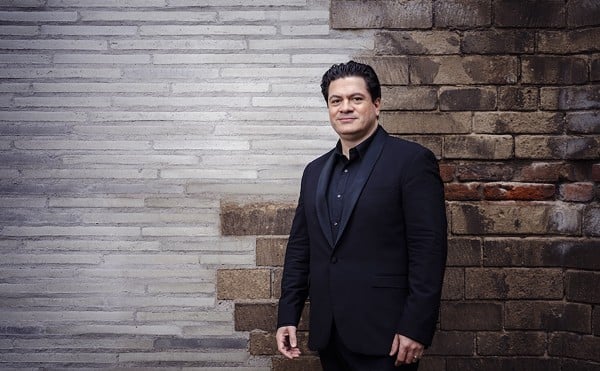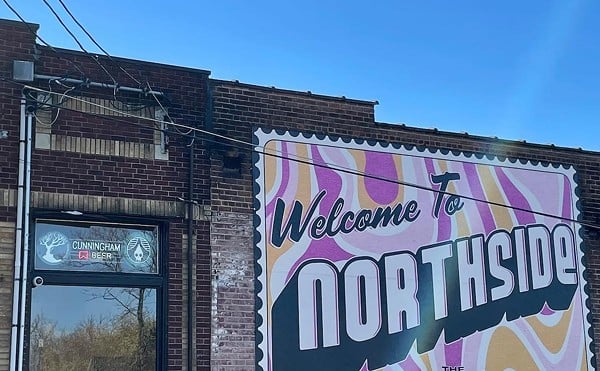The music industry is far from normal right now — festivals, tours and gatherings of all kinds are at a standstill. And yet, some creatives and organizers are pioneering through the unknown, finding ways to make the most of a virtual landscape.
Four local organizations — Nelsonville Music Festival, Girls Rock Cincinnati, MYCincinnati and Thrive Stream — have worked to embrace virtual events. One Zoom meeting, YouTube video or Facebook Live at a time, these groups are setting an example for artists and organizers who want to carry on, social-distancing style.
Nelsonville Music Festival
Last year in early June, music and art fans were gathering in Nelsonville, Ohio for the 15th-annual Nelsonville Music Festival (NMF). The event is a production of Stuart’s Opera House, a nonprofit performing arts center in southeast Ohio that hosts concerts throughout the year, as well as a number of music and arts education programs.
In June of this year, however, the festival grounds were empty and the staff was deciding how and when to go virtual.
“Clearly there was a need for art and music amid a global pandemic,” says Chloe Musick, the marketing and PR director for Stuart’s Opera House. “It’s pretty obvious that people are wanting something to fill the void.”
This year’s event will be held Aug. 21-22 on the NMF YouTube channel. The stream is free but there will be links to donate and purchase merch.
All proceeds from NMF go toward Stuart’s Opera House and its Arts Education Program. Most of the programs they offer are free, including the popular Afterschool Music Program, where kids come to Stuart’s to learn how to play instruments.
“They’re placed into bands, and the culmination of their experiences is performing at the Nelsonville Music Festival,” Musick says.
Hosting NMF 2020 virtually gives Stuart’s Opera House a chance to draw attention to their mission, and to raise some of the funding they’ll miss out on from the absence of this year’s live event. In order to make this a viable option, they called upon the generosity of NMF alumni and friends.
“We were looking for artists who were ultimately willing to donate their time and their music,” Musick says. “It’s out of the goodness of their heart, which has been humbling and inspiring.”
Headliners this year include Caamp, Mandolin Orange and Shovels & Rope, with locals Ernie Johnson From Detroit and Leggy, plus the kids from Stuart’s Afterschool Music Program. Get more details at nelsonvillefest.org.
Girls Rock Cincinnati
Music education is also at the center of Girls Rock Cincinnati, another group which found a way to take this year’s event to the virtual stage.
Girls Rock Cincinnati is a week-long music and arts summer camp for girls and gender variant youth founded by Marlo Salem. Girls Rock held their inaugural camp last August, and just completed their second camp virtually.
“(Providing) free, high-quality, engaging, collaborative programming to the young people in our community is really crucial,” Salem says, “so there’s no way that we were going to stop doing it.”
In order to make the camp work in a virtual format, the organizers had to rethink the entire camp model. Playing in sync as a group over video chat isn’t feasible, so the standard format was out of the question. Instead of forming bands, writing and practicing songs together, and doing an in-person performance, the organizers decided to shift to a condensed, project-based model.
Flexibility and willingness to abandon old expectations was key to making the virtual camp work. Exchanging ideas with other organizers was also essential. Girls Rock Cincinnati is modeled after the international Girls Rock Camp Alliance. With the global threat of COVID-19, organizers across the world were sharing ideas for digital camps.
The leadership behind Girls Rock were pleasantly surprised by how engaged their campers were with the virtual format.
“They seemed almost more excited than in person,” Salem says with a laugh. They explain that during in-person camp, the campers would need most of the week to get over initial shyness. “When you have to be in a room with a bunch of new people and in a space (you’ve) never been to before, it’s really nerve-racking.”
Girls Rock Cincinnati has finished their camp for the year, but the culmination of their hard work has yet to debut. You can watch the campers perform their collaborative camp song in a pre-recorded video at 7 p.m. Aug. 15. Follow Girls Rock Cincinnati at facebook.com/girlsrockcinci and Instagram to learn where to stream the video, and more about upcoming events.
MYCincinnati
Like the Girls Rock camp, MYCincinnati youth orchestra is modeled after a global organization — Venezuela’s El Sistema, a music education and social outreach program for children.
Taylor Eggers helps organize Girls Rock and works as a teaching artist for MYCincinnati. According to Eggers, MYCincinnati didn’t miss a beat in the transition to virtual.
“Once COVID-19 hit, we took about a week off to develop a plan and then immediately switched it to online teaching,” Eggers says. “Every teacher in the world right now is coming together and spreading their ideas. It’s a totally new way of teaching.”
Each year, the Price Hill Creative Community Festival pairs its artists-in-residence with MYCincinnati musicians for special collaborations.
“Instead of canceling (the artist-in-residence program), we just decided to have them resubmit proposals for virtual collaboration, and all of them were really incredible,” says Salem from Girls Rock, who also works as Artistic Programs Coordinator at MYCincinnati. They note that the virtual format allowed MYCincinnati musicians to get more time with the artists, and to collaborate with students from El Sistema-inspired programs around the country.
The MYCincinnati musicians finished their collaborations with the PHCCF artists-in-residence for a virtual festival that happened July 22-25. If you missed it, don’t sweat. Another advantage to the virtual scene is the ability to archive what creatives are doing at this time.
Get more details at mycincinnatiorchestra.org or creativecommunityfestival.org.
Thrive Stream
Jordan Tuss is one of four organizers behind Thrive Stream. Unlike the rest of these organizations, Thrive Stream was created directly in response to COVID-19 as a way to bring together the Cincinnati community while providing a safe, accessible space for expression.
Tuss says that people from all across the country tuned in to watch their first streaming event in May — about 13,000 viewers total. That first Thrive Stream featured live music, art instruction, a cooking class, cocktail tips and kid-friendly performances.
“We’ve helped people realize it’s a lot easier to go live,” Tuss says. “I have noticed that the people who are on the bills end up doing more live stuff after they do a Thrive Stream.”
Subsequent streams have continued to feature live music and interactives like cocktail classes for both entertainment and to raise funds for local causes. For example, on Aug. 8, a concert on the CincyMusic Facebook page benefitted Over-the-Rhine’s Elementz youth urban arts center.
Follow CincyMusic at facebook.com/cincymusic.com — as well as collaborators Ladywood, Grrl + Weapon and No Standing Only Dancing — on social media for info on upcoming Thrive Stream events.
Comfort of Home
Intimacy, comfort, accessibility — all of these things get amplified on a virtual platform. Streaming performances also allow artists to reach the entire internet-connected world.
“(Virtual events) can give smaller artists a chance to be seen and heard,” Stuart’s Opera House’s Musick says. “And, on the other end, it makes larger artists more accessible.”
Tuss says it also puts artists in a unique position to connect with their viewers more directly. As fans tune in or engage through comments, their name is tied to the video. This adds more intimacy on both ends.
“You’re not just a name in the crowd anymore screaming at the stage,” Tuss says.
Viewers are presumably more attentive without the distraction that comes with being in a crowd, and a captive audience makes it easier for organizations and performers to draw attention to their purpose or mission. For instance, anyone tuning in to watch NMF 2020 will learn about their cause. That’s information that might go unnoticed in the flurry of a live festival.
“We’re going to have introductions where we thank sponsors and the artists for supporting,” Musick says.
In between sets, they’ll have a chance to share the NMF and Stuart’s Opera House mission and guide viewers to the donation and merch links.
Fans of live music may lament its absence from life as we currently know it, but the virtual scene definitely has something to offer, too — as long as you’re willing to be flexible and play with the format.
“I think it’s about really distilling why you’re doing what you’re doing,” Salem says. “It’s OK for that reason to be because we’re having fun. It’s more than OK.”

